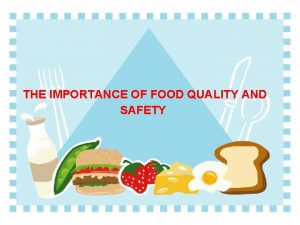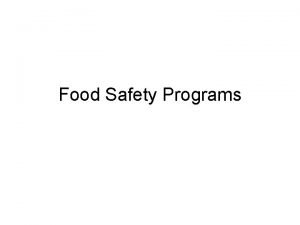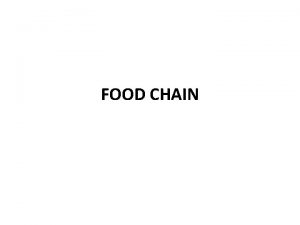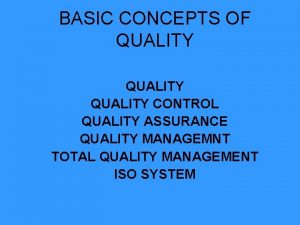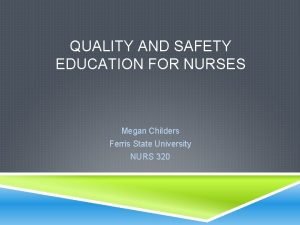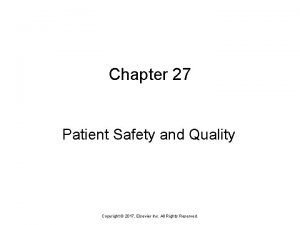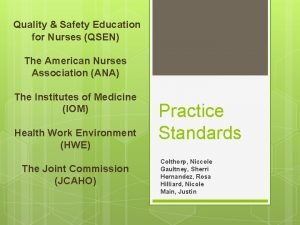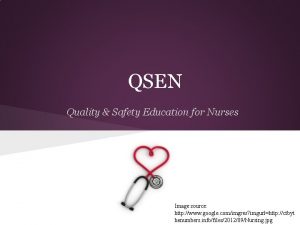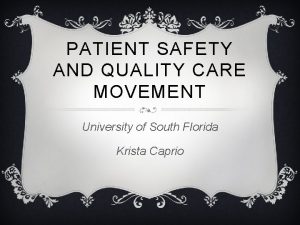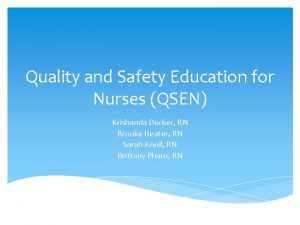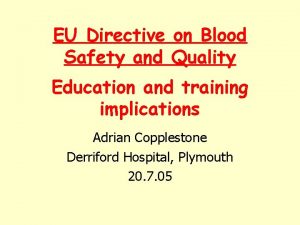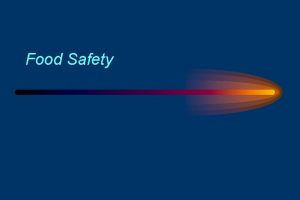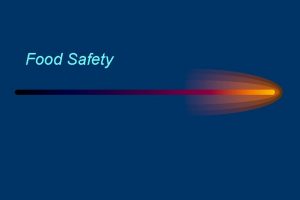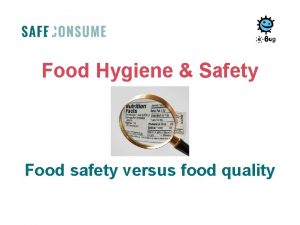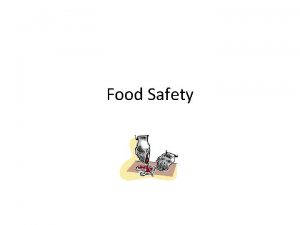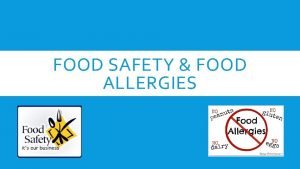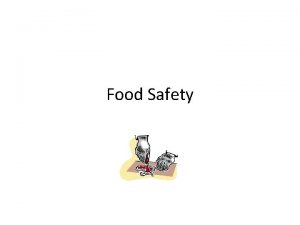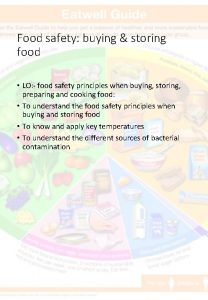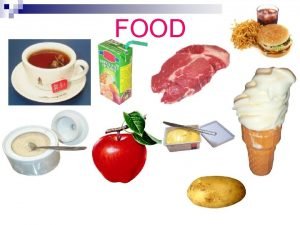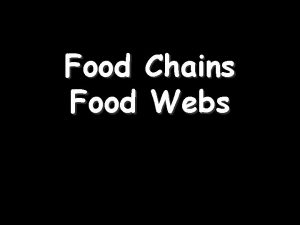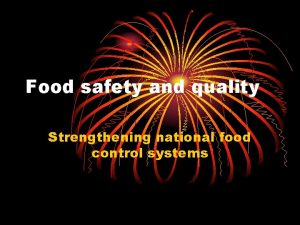THE IMPORTANCE OF FOOD QUALITY AND SAFETY v















- Slides: 15

THE IMPORTANCE OF FOOD QUALITY AND SAFETY

v Our nutritional status, health, physical and mental faculties depend on the food we eat and how we eat it. v Safety of food is a basic requirement of food quality. v "Food safety" implies absence or acceptable and safe levels of contaminants, adulterants, naturally occurring toxins or any other substance that may make food injurious to health on an acute or chronic basis. v Food systems in developing countries are not always as well organized and developed as in the industrialized world. v Problems of growing population, urbanisation, lack of resources to deal with pre- and post- harvest losses in food, and problems of environmental and food hygiene mean that food systems in developing countries continue to be stressed, adversely affecting quality and safety of food supplies.

FOOD QUALITY AND SAFETY CONTROL AND FOOD SECURITY v PEOPLE IN DEVELOPING COUNTRIES ARE THEREFORE EXPOSED TO A WIDE RANGE OF POTENTIAL FOOD QUALITY AND SAFETY RISKS. THE OVERALL INCREASE IN POPULATION AND IN THE URBAN POPULATION IN PARTICULAR, POSES GREAT CHALLENGES TO FOOD SYSTEMS. SOME OF THE NEWER TECHNOLOGIES (APPLICATION OF BIOTECHNOLOGY), PRACTICES AND TECHNOLOGIES MAY ALSO POSE POTENTIAL PROBLEMS OF FOOD SAFETY AND NUTRITIONAL QUALITY AND CALL FOR SPECIAL ATTENTION IN ORDER TO ENSURE CONSUMER PROTECTION. STREET FOOD PROVIDE THE ENERGY AND NUTRIENT NEEDS OF LARGE SEGMENTS OF WORKERS AND THEIR FAMILIES IN THE CITIES. CLEAN AND NUTRITIOUS STREET FOODS HAVE A POSITIVE

Food quality and safety considerations form an integral part of their food security system. In all countries the food industry bears the responsibility of meeting food quality and safety regulatory requirements. The food industry encompasses the activities of small-scale farmers and artisanal fisheries, through medium to large-scale producers; food storage; processing; wholesale and retail marketing. Industry must play its role in assuring food quality and safety through the application of quality assurance and risk-based food safety systems utilising current scientific knowledge.

FOOD QUALITY AND SAFETY CONTROL AND FOOD TRADE The value of the world food trade is increasing every year. Consumers expect that foods will meet basic quality and safety standards and requirements related to food hygiene, labelling and certification, use of food additives, limits for pesticide residues etc. Food exports are a major source of foreign exchange and income generation for rural and urban workers in agriculture and agro-industrial sectors. This requires improvement within national food control systems and within industry food quality and safety programmes. The international trading environment has changed in the light of GATT, the World Trade Organization (WTO). Two Agreements introduce a measure of discipline in international trade and are extremely relevant to food safety and quality issues. These are: • Agreement on Application of Sanitary and Phytosanitary Measures (SPS). • Agreement on Technical Barriers to Trade (TBT).

IMPROVING FOOD QUALITY AND SAFETY MAKES ECONOMIC SENSE Food -contaminated or adulterated, reduce its nutritional quality and inflicting severe harm to their nutritional well-being and to their household economies. Food-borne diseases are a worldwide problem of great magnitude, both in terms of human suffering and economic costs. Inappropriate use of chemicals can cause health problems. Plant toxins have also been implicated in food safety problems. Estimation of the economic consequences of unsafe or contaminated food is complex. A Staphylococcus aureus outbreak in India, showed that 41% of the total cost of the outbreak was borne by the affected persons which included loss of wages or productivity loss and other expenses

Food supply systems in developing countries are often fragmented involving a multitude of middlemen. This exposes it to various types of fraudulent practices. Food is a good indicator of the state of the environment in which it is produced. Monitoring of environmental contaminants in food assists in ensuring food safety and also give early warnings about the state of the environment, such as level of heavy metal contamination to enable appropriate action for maintaining its productivity.

NEED FOR ACTION Large sections of the populations in many developing countries still suffer from the ravages of unsafe, unhygienic or adulterated food, and severe losses in food export trade. Several causes for unsatisfactory situation which need attention. • Food systems are complex. In the case of developing countries, they are also highly fragmented and predominated by small producers. As large quantities of food pass through a multitude of food handlers and middlemen extending the food production, processing, storage and distribution chain, control is more difficult and there is a greater risk of exposing food to contamination or adulteration

. Lack of resources and infrastructure for post-harvest handling, processing and storage leads to severe diminishing of quality and avoidable contamination and food losses. It is the duty of the government to ensure compliance by industry to national food quality and safety requirements.

The Importance of Quality Assurance and Food Safety in Modern Food Production Systems The liberalization of the global trade, and the fact that the consumers in the industrialized countries are more and more demanding food to be not only economical, but also healthy, tasty, safe and sound in respect to animal welfare and the environment. The competitiveness of food production will soon be more dependent on the reliability of the safety and the quality of the food and acceptability of the production procedures than on quantity and price. Quality-oriented markets are market-driven.

There is a steady increase of the national and international standards for food safety and public health. There is a growing influence of the consumer's demands (often completely ignorant of agriculture) on the animal production, its allied industries, advisers, consultants and food animal veterinarians. Agricultural supply of food production is facing remarkable changes in the years to come, which is both challenge and opportunity for food animal producers, packing plants and meat processors as well as for the veterinary profession.

Food safety is a scientific discipline describing handling, preparation, and storage of food in ways that prevent food borne illness. This includes a number of routines that should be followed to avoid potentially severe health hazards. These include safety between industry and the market and then between the market and the consumer. In considering industry to market practices, food safety considerations include the origins of food including the practices relating to food labeling, food hygiene, food additives and pesticide residues, as well as policies on biotechnology and food and guidelines for the management of governmental import and export inspection and certification systems for foods.

In considering market to consumer practices, the usual thought is that food ought to be safe in the market and the concern is safe delivery and preparation of the food for the consumer. Food can transmit disease from person to person as well as serve as a growth medium for bacteria that can cause food poisoning.

The five key principles of food hygiene, according to WHO, are: Prevent contaminating food with pathogens spreading from people, pets, and pests. Separate raw and cooked foods to prevent contaminating the cooked foods. Cook foods for the appropriate length of time and at the appropriate temperature to kill pathogens. Store food at the proper temperature. Do use safe water and cooked materials.

 Food quality importance
Food quality importance Control measures for physical hazards
Control measures for physical hazards Unit 2 food food food
Unit 2 food food food Grazing food chain diagram
Grazing food chain diagram Perform quality assurance
Perform quality assurance Basic quality concepts
Basic quality concepts Megan childers
Megan childers Chapter 27 patient safety and quality
Chapter 27 patient safety and quality Safety quality productivity
Safety quality productivity Quality and safety education for nurses
Quality and safety education for nurses Quality and safety education for nurses
Quality and safety education for nurses Samantha taylor ndis commission
Samantha taylor ndis commission Patient safety and quality care movement
Patient safety and quality care movement Quality safety education for nurses
Quality safety education for nurses Blood safety and quality regulations
Blood safety and quality regulations Importance of quality in pharmaceutical industry
Importance of quality in pharmaceutical industry
